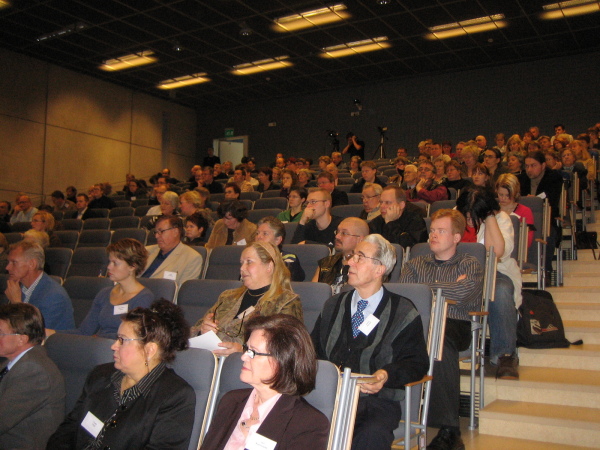Experiments on Democratic Deliberation Deliberative
democracy For some time now political
theorists
have advocated a more
deliberative form of democratic practice as a supplement to more
conventional
electoral democracy. They claim that citizens brought together to
discuss
public policy in a setting that emphasizes equal participation, mutual
respect
and reasoned argument will be more likely to bridge the differences of
today’s
fragmented society. Citizens participating in a deliberative democracy
will also
be more likely to produce policy decisions that are both perceived as
more
legitimate and are in fact more consensual, rational and just. In
recent years
theory have turned to practice in an attempt to realize the promises of
deliberative democracy. This has lead to a proliferation of
deliberative
practices around the world. Introduction On The participants Before the actual deliberation
day, a
survey, mainly
covering political issues in general and energy policy in particular,
had been
sent to a random sample of 2500 people from the  Information and
experts Deliberation in
groups After the plenary discussion it
was
time for the actual
deliberation which took place in 12 small groups to which participants
were
randomly allocated. Two small groups were reserved for the
Swedish-speaking
minority. The small groups consisted of 10 - 13 members. The
participants were
asked to follow certain rules of discussion, such as being respectful
towards
each others opinions and justifying one’s own
views. Trained moderators made sure that the group discussions
were unbiased and respectful toward all participants, but otherwise
they did
not to take part in the discussion. In the beginning of the small group
discussions,
each participant stated a viewpoint which they wished to be discussed,
and a
free discussion on these themes followed. The discussions lasted for
three
hours, after which the groups were asked to make a decision on whether
a sixth
nuclear power plant should be built in Decision-making There were two experimental
treatments. Namely, in six small
groups the decision was made by secret ballot, whereas in the other six
groups
it was made by formulating a common statement. The variation in the
decision-making procedure was the only difference between the groups,
and
otherwise they followed exactly the same procedure of discussion. In
the vote
groups, members could vote yes, no or cast an empty ballot. In the
common
statement groups, there was a predetermined procedure of writing a
final
statement. Research Problems and questions of interest Experiments on democratic deliberation usually have two different approaches to deliberation by either aiming at a consensus (consensus conferences) or by ending in a vote or an opinion poll (citizens’ juries, deliberative polls). In our experiments we used both approaches, giving us the possibility to compare the quality and effect the different approaches have on citizen deliberation. We study the group decision making process and small group dynamics. Several variables were studied through surveys, for example, political knowledge, efficacy, trust, political participation and collective action. Results Our initial finding is that the
volunteers who were willing
to take part in the experiment were more inclined to act politically
than those
who did not volunteer; they also possessed a higher level of internal
political
efficacy and had more trust in the parliament and politicians.
Concerning the
energy related issues, the participants became more critical of the use
of
peat, coal and building a sixth nuclear power plant in There was a slight decrease in
the
impression of one’s own
possibility to influence on politics, but the participants’ trust in
parliament
and politicians had increased during deliberation. Interpersonal trust
increased slightly as well as the participants willingness to take a
particular
kind of collective action (electricity saving). Even more significantly,
deliberation increased the participants' belief that other people would
be ready to save electricity. This may be interpreted as a consequence
of the fact that deliberative settings encourage expressions of
socially desirable motivations. However, deliberation did not increase
the participants' preparedness to act politically. Virtual
deliberative
experiment 2008 Arranging deliberative events
is quite
expensive and
ineffective and if these practices are to have an impact on democracy
at large,
they need to move from real world into the virtual world. Virtual
deliberation
gives us the possibility to bring real-time democratic interaction to
the
citizens, without having to organize a big costly event with the
restrictions
of travel and accommodation. In our experiment discussants met in an
online
forum and the interaction was realized through webcams and microphones.
This
enabled the participants to take part in the deliberation from their
own homes
or where ever they can get on-line. The on-line experiment was
developed
as a replication of the
face-to-face experiment (in, 2006) with the actual discussion
consisting of as
many groups, but with fewer participants (79 all-in-all, making it
around 7
people in each small group). The participants were this time gathered
from all
over country, not only from the Even though the use of the virtual forum demanded some basic computer knowledge and there were some technical difficulties along the way, the participants represented a wide spectrum. Both men and women, as well as people from all different age groups between 18 and 67 years of age took part in the experiment. |
Results Moderators' Guidelines Political Knowledge Items Kansalaiskeskustelu Medborgardiskussion D:CE Frontpage |
 |
||
 |
||
 |
||
 |
|
|